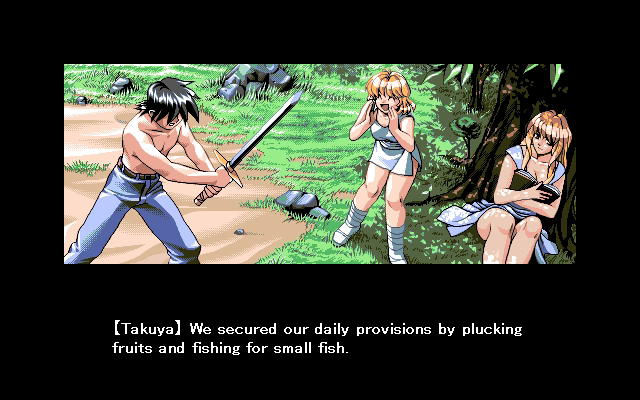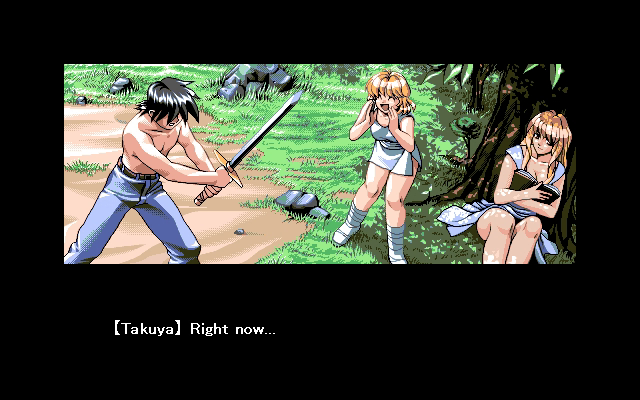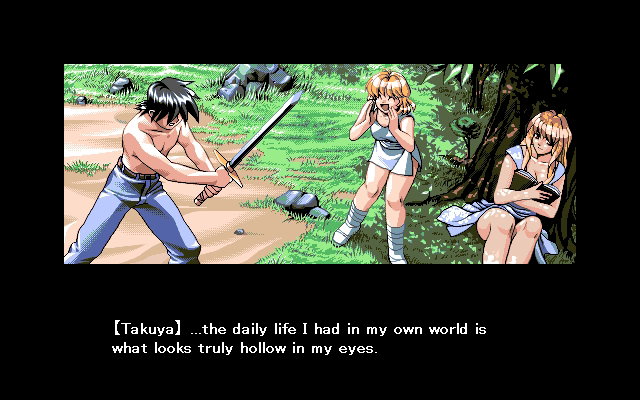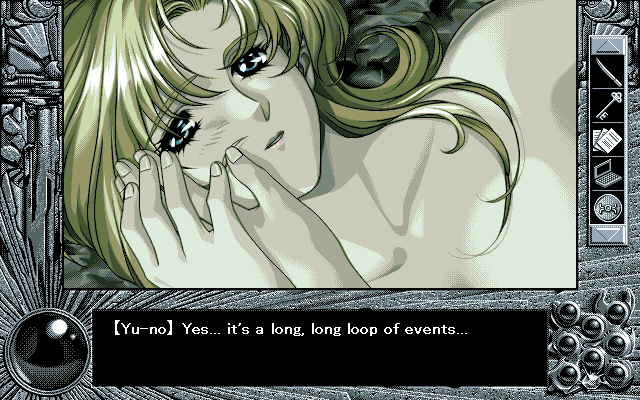YU-NO itself begins and ends with parent–child incest. Takuya’s mother is a buxom blonde alien priestess, and his daughter and wife is a buxom blonde alien priestess. Takuya leaves modernity to return to a hunter-gatherer lifestyle in the Epilogue. Takuya, then, completes a loop from modernity back to a life more like the origin of humanity, complete (though idealized) subsistence.

Kanno presents Takuya’s primitive family life with Sayless and Yu-no as an Edenic ideal. Rather than existing amid agriculture, industry, or any sort of society in any stage of human development, they pick fruit off trees, catch fish from the river, and never travel far from their house. They live in extreme Koudai-style gender roles and blissful ignorance of the politics of the capital or Sakaimachi while feeling incestuous and pedophiliac sexual attraction without concern. Takuya rejects all the friends, lovers, and community of the Prologue and ADMS section even before the very ending where this rejection becomes irrevocable and hence compels the player to do the same. He states the rugged individualist and incestuous idyll far exceeds the life of society and responsibility in Sakaimachi:


Only the incursion of society into their paradise destroys it upon the arrival of the Imperial Guard. The smaller the social circle, the less contact one has with others, the more complete the regression, the better.

YU-NO serves an antisocial longing to return to a prelapsarian infancy or utero. In The Interpretation of Dreams, Freud writes that the notion of Paradise is “nothing but the mass-phantasy of the childhood the individual,” a recollection of early childhood when one is unashamed of nudity and not yet conscious of sexuality, of culture, of society, of other people. “[I]n paradise men are naked and unashamed, until the moment arrives when shame and fear awaken; expulsion follows, and sexual life and cultural development begin” (294). Koudai transcends and abandons a society whose academics rejected him. And Takuya embarks on a more shocking abandonment of maturity, not least because the player is made to identify with and endure Takuya’s struggles for tens of hours first. Takuya realizes a longing to return, naked, not only to infancy but to utero through his motherlike daughter’s womb instead of Kaytia’s. For Kaytia cannot be wholly Takuya’s but is in part Koudai’s. Yu-no’s breasts, however, belong solely to Takuya. Note that “solely” excludes the possibility that the breasts are the woman’s. Of course, in Koudai’s way of living, the woman cannot be her own person but must belong to a man.
Ending the story by returning to the beginning of causality, Takuya’s Oedipal quest to avoid all of life’s opportunities by being unborn takes him back also to the root of events. More conventional time loop stories such as Urusei Yatsura 2 or Groundhog Day compel their protagonists to grow or break the stasis to escape the time loop prison and return to the conflicts and possibilities for love and development that life offers. YU-NO instead rejects growth, or rather forces the protagonist to grow in a deranged direction by embracing rather than resolving the Oedipus complex, aggression, lust, and misogyny that a naïve reading would assume are meant as Takuya’s failings. Takuya escapes the time loop not into adult reality but into the incestuous fantasy of his earlier dreams to abandon challenge, conflict, and adulthood to have sex with a dependent and submissive child forever, alone. Watching this, in his final message to Takuya, the glorious Koudai, now respecting his son as a man, inverts the envy. Koudai admits, “I am both envious and jealous of you.” For, in Koudai’s way of living, a man would want nothing more than this fate.
In the same manner that there are eide that exist in eternal and unchanging stasis, in YU-NO, Takuya and Yu-no’s fate of incest and stunted growth is eternal and perfect. The subtitle “the girl who chants love at the bound of this world” alludes to the Harlan Ellison story “The Beast that Shouted Love at the Heart of the World,” which describes all “insanity” in all parallel universes, including the nuclear wars that destroy human civilization, as originating with the transformation of a dragon called “the maniac” at “the center” of time. By analogy, in YU-NO, all love originates with the Yu-no–Takuya relationship, with Yu-no “chanting love.” Parental incest, Takuya finding his nude twelve-year-old daughter hot and all that follows, is the Platonic eidos of love. YU-NO is a total rejection of humanity.